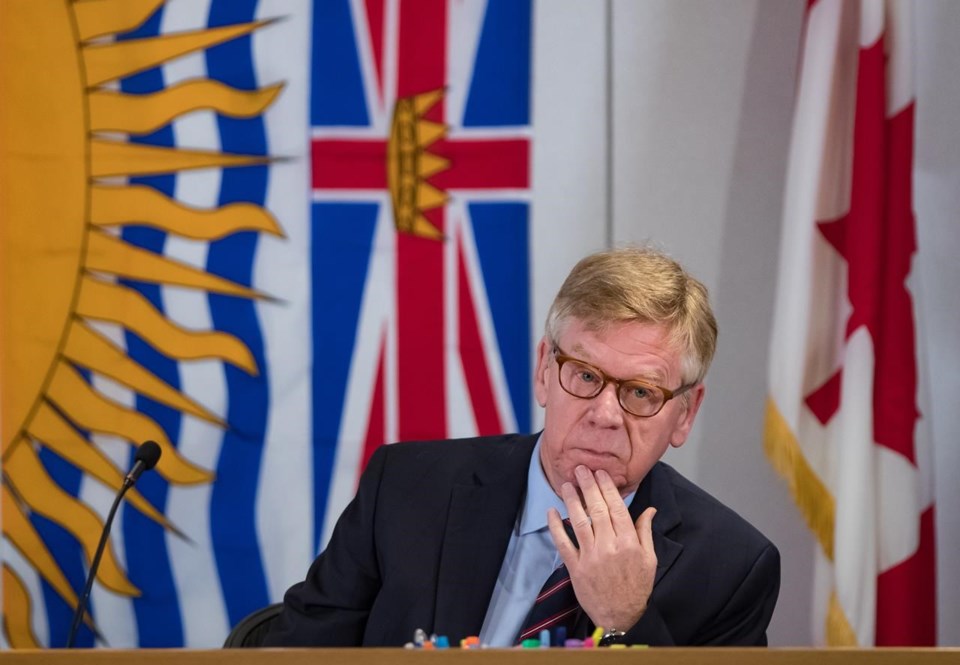VANCOUVER — The president of the British Columbia Lottery Corp. says the first time he officially heard organized crime groups were laundering money at provincial casinos was six years ago during a meeting with the RCMP.
Up until the 2015 police briefing, there had long been concerns about suspicious cash circulating at casinos but the RCMP report confirmed it, Jim Lightbody told an inquiry into money laundering on Thursday.Â
"That was a pivotal moment for us because we had now heard from the RCMP ... that there are proceeds of crime being used through a money service business in Richmond," Lightbody said. "That alarmed me greatly. I was blown away."
Lightbody testified the report prompted the lottery corporation to step up its anti-money laundering efforts in 2015, which included requiring some players to disclose the source of their cash and banning others from the facilities outright.
"We were all shocked at this," he said. "We said, 'We've got to do something about this.' "
The lottery corporation — which has a mandate to manage and safeguard casinos — implemented a policy in 2018 saying players wanting to buy in at a casino with $10,000 or more in cash must prove where the money came from.
But the inquiry heard prior to 2015 it was not uncommon for people to arrive at B.C. casinos with bags containing hundreds of thousands of dollars worth of $20 bills.
The provincial government called the inquiry after a 2018 report by former RCMP deputy commissioner Peter German concluded organized crime groups used B.C. casinos to launder illegal cash obtained through drug sales and other illicit activities.
German said the crime groups loaned their illegal cash to players who would gamble at the casinos and later repay the criminals with the money they received after cashing out.
Lightbody said when people arrived at casinos with large bags of cash, suspicions were aroused, but the corporation previously allowed it because many high-spending patrons frowned upon using cheques, drafts or having specialized credit accounts at casinos for privacy and cultural reasons.
"These are people who first of all have a real concern about their privacy and they have a real concern about 'government' knowing how much money they have, and so using methods like cheques and other things like that aren't things that they are necessarily drawn to," said Lightbody.
Commission lawyer Patrick McGowan questioned Lightbody about whether players with large amounts of cash should have been asked more detailed questions about the origin of their money.
"Wasn't really the obvious question, not how did they make their money but where did the $200,000 in $20 bills in the grocery bag they just put on the counter come from?" asked McGowan.
Lightbody said the players may have kept the cash in a bag as a disguise before entering the casino.
"It was a real eye-opener for a lot of us into this culture of wanting to use cash, especially for things like gaming that some people may see as a sin," he said. "They don't want, maybe, certain people in their family knowing that they are using and spending that amount of money."
Former gaming investigator Larry Vander Graaf, who is also a former Mountie, told the commission last November the B.C. Lottery Corp. did not move quickly enough to protect the integrity of gaming from organized crime more than a decade ago.
He said suspicious cash started to appear at B.C. casinos in 2007 and by 2010 loan sharks were circulating nearby parking lots with bags of money believed to be from proceeds of crime.
Lightbody, who's currently on medical leave from his position, said the lottery corporation did everything within its powers to mitigate the risk of money laundering.
The province appointed B.C. Supreme Court Justice Austin Cullen in 2019 to lead the public inquiry into money laundering after three reports, including two by German, outlined how hundreds of millions of dollars in illegal cash affected the real estate, luxury vehicle and gaming sectors.
- By Dirk Meissner in Victoria
This report by The Canadian Press was first published Jan. 28, 2021.
The Canadian Press



